Related Research Articles

Mikhail Afanasyevich Bulgakov was a Russian, later Soviet writer, medical doctor, and playwright active in the first half of the 20th century. He is best known for his novel The Master and Margarita, published posthumously, which has been called one of the masterpieces of the 20th century.

Russian literature refers to the literature of Russia and its émigrés and to Russian-language literature. The roots of Russian literature can be traced to the Middle Ages, when epics and chronicles in Old East Slavic were composed. By the Age of Enlightenment, literature had grown in importance, and from the early 1830s, Russian literature underwent an astounding golden age in poetry, prose and drama. Romanticism permitted a flowering of poetic talent: Vasily Zhukovsky and later his protégé Alexander Pushkin came to the fore. Prose was flourishing as well. Mikhail Lermontov was one of the most important poets and novelists. The first great Russian novelist was Nikolai Gogol. Then came Ivan Turgenev, who mastered both short stories and novels. Fyodor Dostoevsky and Leo Tolstoy soon became internationally renowned. Other important figures of Russian realism were Ivan Goncharov, Mikhail Saltykov-Shchedrin and Nikolai Leskov. In the second half of the century Anton Chekhov excelled in short stories and became a leading dramatist. The beginning of the 20th century ranks as the Silver Age of Russian poetry. The poets most often associated with the "Silver Age" are Konstantin Balmont, Valery Bryusov, Alexander Blok, Anna Akhmatova, Nikolay Gumilyov, Sergei Yesenin, Vladimir Mayakovsky, and Marina Tsvetaeva. This era produced some first-rate novelists and short-story writers, such as Aleksandr Kuprin, Nobel Prize winner Ivan Bunin, Leonid Andreyev, Fyodor Sologub, Yevgeny Zamyatin, Alexander Belyaev, Andrei Bely and Maxim Gorky.

Iosif Aleksandrovich Brodsky was a Russian and American poet and essayist.
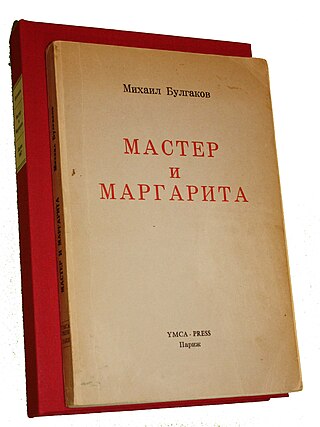
The Master and Margarita is a novel by Soviet writer Mikhail Bulgakov, written in the Soviet Union between 1928 and 1940 during Stalin's regime. A censored version, with several chapters cut by editors, was published in Moscow magazine in 1966–1967, after the writer's death, by his widow. The manuscript was not published as a book until 1967, in Paris. A samizdat version circulated that included parts cut out by official censors, and these were incorporated in a 1969 version published in Frankfurt. The novel has since been published in several languages and editions.
Andrei Platonovich Klimentov, known by the pen name Andrei Platonov, was a Soviet Russian novelist, short story writer, philosopher, playwright, and poet. Although Platonov regarded himself as a communist, his principal works remained unpublished in his lifetime because of their skeptical attitude toward collectivization of agriculture (1929–1940) and other Stalinist policies, as well as for their experimental, avant-garde form infused with existentialism. His famous works include the novels Chevengur (1928) and The Foundation Pit (1930).

Boris Nikolaevich Bugaev, better known by the pen name Andrei Bely or Biely, was a Russian novelist, Symbolist poet, theorist and literary critic. He was a committed anthroposophist and follower of Rudolf Steiner. His novel Petersburg (1913/1922) was regarded by Vladimir Nabokov as the third-greatest masterpiece of modernist literature. The Andrei Bely Prize, one of the most important prizes in Russian literature, was named after him. His poems were set to music and performed by Russian singer-songwriters.

Heart of a Dog is a novella by Russian author Mikhail Bulgakov. A biting satire of Bolshevism, it was written in 1925 at the height of the NEP period, when communism appeared to be relaxing in the Soviet Union. It is generally interpreted as an allegory of the Communist revolution and "the revolution's misguided attempt to radically transform mankind." Its publication was initially prohibited in the Soviet Union, but it circulated in samizdat until it was officially released in the country in 1987. It was almost immediately adapted into a movie, which was aired in late 1988 on First Channel of Soviet Television, gained almost universal acclaim and attracted many readers to the original Bulgakov text. Since then, the novella has become a cultural phenomenon in Russia, known and discussed by people "from schoolchildren to politicians." It was filmed in Russian and Italian language versions, and was adapted in English as a play and an opera.
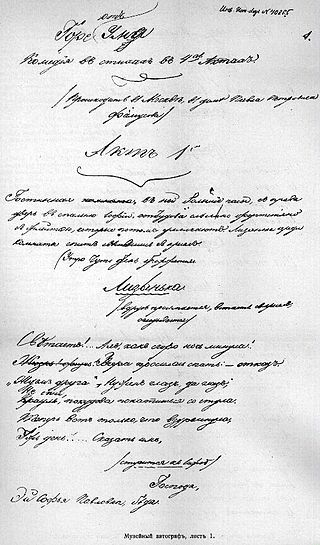
Woe from Wit is Alexander Griboyedov's comedy in verse, satirizing the society of post-Napoleonic Moscow, or, as a high official in the play styled it, "a pasquinade on Moscow."
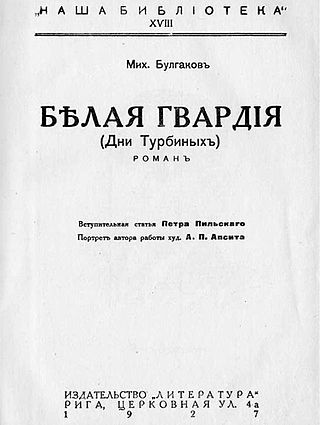
The White Guard is a novel by Mikhail Bulgakov, first published in 1925 in literary journal Rossiya. It was not reprinted in the Soviet Union until 1966.
Igor Markovich Yefimov or Igor Efimov was an American philosopher, historian, writer and publisher of Russian origin. Some of his works were published under the pen name Andrei Moscovit. Together with Boris Vakhtin, Sergei Dovlatov, Vladimir Gubin, and Vladimir Maramzin, he founded the Leningrad writers' group "Townspeople" (Gorozhane), whose works circulated in samizdat. He was also the founder of Hermitage Publishers; a company specializing in Russian writers.
The following is a bibliography of the works of Mikhail Bulgakov in English and Russian.

Ardis Publishing, began in 1971, as the only publishing house outside of Russia dedicated to Russian literature in both English and Russian, Ardis was founded in Ann Arbor, Michigan by husband and wife scholars Carl R. Proffer and Ellendea C. Proffer. The Proffers had two goals for Ardis: one was to publish in Russian the "lost library" of twentieth-century Russian literature which had been censored and removed from Soviet libraries ; the other was to bring translations of contemporary writers working in the Soviet Union to the West. Ardis has published around 400 titles, roughly half in English, half in Russian.
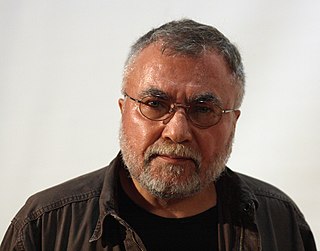
Alexei Petrovich Tsvetkov was a Russian poet and essayist.
A School for Fools is a novel by soviet author Sasha Sokolov. The first draft of the book was completed in 1973 and distributed via samizdat. In 1975 a manuscript was submitted to Ardis Publishing. The book was published in the United States in 1976. For the annotation, a publisher, Carl Proffer, used compliments on the work from Vladimir Nabokov's letter. In 1977 Ardis issued the English edition, translated by Carl Proffer.
Carl Ray Proffer was an American publisher, scholar, professor, and translator of Russian literature. He was the co-founder of Ardis Publishers, the largest publishing house devoted to Russian literature outside of the Soviet Union, and co-editor of Russian Literature Triquarterly (1971–91).

The Bulgakov House is situated on the ground floor of Bolshaya Sadovaya ulitsa no. 10 in Moscow, in the building where the Soviet writer Mikhail Bulgakov used to live, and in which some major scenes of his novel The Master and Margarita are set. The museum was established as a private initiative on May 15, 2004.
Taking Stock is a 1970 novel by Yury Trifonov. It is the second volume of his Moscow quintet.
The Long Good-Bye is a 1971 novel by Yury Trifonov. It is the third of five volumes in his Moscow cycle.
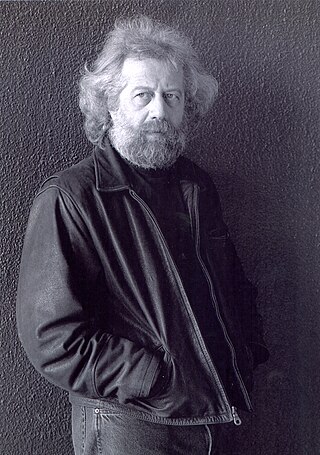
Vladimir Arkadyevich Gandelsman is a Russian poet and translator.
Marian Schwartz is an American translator of contemporary Russian literature. She is the principal English translator of the author Nina Berberova and has translated over 70 books of fiction, history, biography, and criticism into English. She is the recipient of two translation fellowships from the National Endowment for the Arts. Based in Austin, Texas, she is the former president of the American Literary Translators Association.
References
- ↑ "Ellendea Proffer Teasley - MacArthur Foundation". www.macfound.org. Retrieved 2018-08-12.
- ↑ "Libraries and Achives for the Third Wave".
- ↑ "Celebrating St. Petersburg Library Exhibit". Archived from the original on 2007-11-16. Retrieved 2010-04-20.
- Boyd, Brian. Nabokov: the Later Years
- Vasily Aksyonov, In Search of Melancholy Baby
- Lev Kopelev & Raya Orlova, We Lived in Moscow